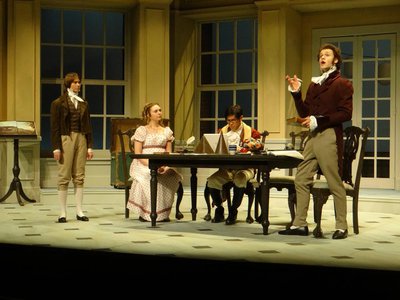
Czech-born playwright Tom Stoppard was knighted as a British subject in 1997, a gesture of literary pomp that, while entirely deserved, nonetheless must have struck Sir Tom as a delicious twist of irony. As the author of such wickedly intelligent plays as Rosencrantz and Guildenstern Are Dead and Arcadia, as well as a co-writer of the screenplay for Terry Gilliam’s dystopic masterpiece Brazil, Stoppard has made a name for himself as an uber-smart iconoclast of insanely inventive plays whose myopic, narcissistic characters are often steamrolled by the big ideas with which they grapple. The only thing grander than Stoppard’s empathy is his lack of romantic attachment to human folly.
And thanks in part to this broadly arching and distinctly unsentimental approach (which he shares with such masters as Swift and Rabelais), Stoppard is capable in his plays of spanning genres and collapsing them at the same moment. For instance, in Arcadia — currently in production at University Theatre under the direction of Scott Kaiser — the playwright moves easily between high-minded banter and bawdy balderdash, while also hitting major sevenths of romance and strumming minor keys of pathos and tragedy. Arcadia, like Stoppard himself, is unclassifiable, and brilliant.
A quantum romp full of mysterious shallows and depths (or, better yet, a tongue-in-cheek investigation of art, ideas, life and death), Arcadia is set at Sidley Park estate in Derbyshire, England, and jumps back and forth in time, between the years 1809 and the present day. In the past, which comes to seem not so distant, Thomasina Coverly (Rachel Faught) is a teenage student grappling with Newtonian determinism, while her foppish tutor, Septimus Hodge (Thomas Varga), seeks to guide the wild orbit of her curiosity (which is as sexual as it is intellectual). From here the play regularly fast-forwards into the mid-1990s, where author Hannah Jarvis (Savannah Edson) and academic snob Bernard Nightingale (Nico Hewitt) engage in a literary tête-à-tête over the legacy of Sidley Park, which may involve the amorous exploits of Lord Byron and the strange appearance of a crazy hermit.
Ideas are Stoppard’s stock-in-trade, and certainly Arcadia is a heady affair, though not nearly so intimidating as it might sound. For all the witticism and head-tripping of the script, it is a deeply humane play; Stoppard lovingly razzes the intellectual vanity and romantic bombast of his characters, and the humor he ekes out of our all-too-human errors is less scathing than touching, sad and funny.
Kaiser’s direction is sharp and confident and straightforward, which is exactly the right way to handle Stoppard’s lofty explorations. John Elliott’s set is gorgeously appointed, and costume shop manager Vicki Vanecek-Young does a bang-up job handling the fashions of two distinct eras.
What really makes UT’s Arcadia work is the cast. As with any Stoppard work, Arcadia is an exercise in combative wordplay and linguistic tomfoolery, and here the actors find a nice balance between the importance of being earnest and the supple delights of Stoppard’s more playful side. The result is a production that inspires laughter and thought in equal measure. Arcadia is a joke whose punch line is bittersweet.